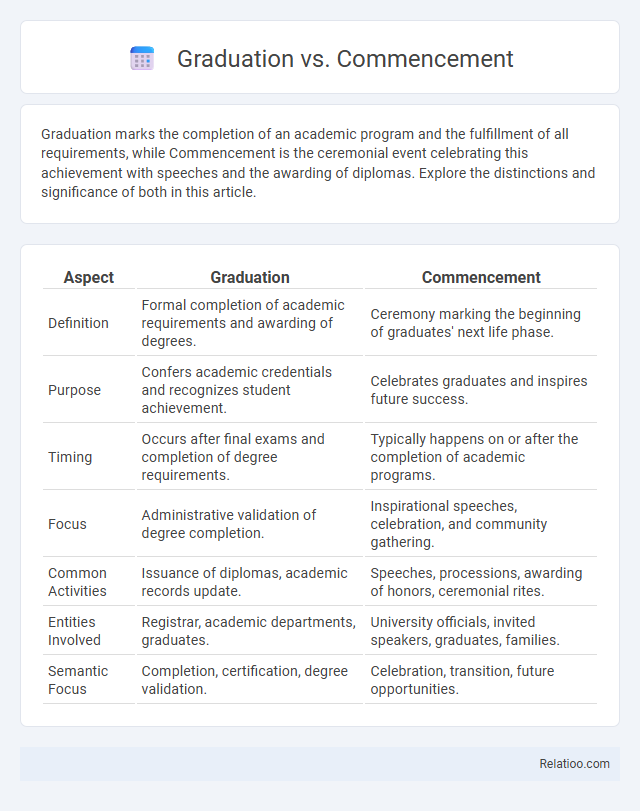Graduation marks the completion of an academic program and the fulfillment of all requirements, while Commencement is the ceremonial event celebrating this achievement with speeches and the awarding of diplomas. Explore the distinctions and significance of both in this article.
Table of Comparison
| Aspect | Graduation | Commencement |
|---|---|---|
| Definition | Formal completion of academic requirements and awarding of degrees. | Ceremony marking the beginning of graduates' next life phase. |
| Purpose | Confers academic credentials and recognizes student achievement. | Celebrates graduates and inspires future success. |
| Timing | Occurs after final exams and completion of degree requirements. | Typically happens on or after the completion of academic programs. |
| Focus | Administrative validation of degree completion. | Inspirational speeches, celebration, and community gathering. |
| Common Activities | Issuance of diplomas, academic records update. | Speeches, processions, awarding of honors, ceremonial rites. |
| Entities Involved | Registrar, academic departments, graduates. | University officials, invited speakers, graduates, families. |
| Semantic Focus | Completion, certification, degree validation. | Celebration, transition, future opportunities. |
Understanding Graduation and Commencement
Graduation signifies the official completion of your academic requirements, marking the conferral of a degree or diploma by the institution. Commencement refers to the formal event celebrating this achievement, often featuring speeches, the awarding of diplomas, and the symbolic turning of tassels. Understanding the difference between graduation as the academic milestone and commencement as the celebratory ceremony helps clarify their distinct roles in academic traditions.
Graduation: Definition and Significance
Graduation signifies the successful completion of an academic program and the formal awarding of a degree or diploma, marking a pivotal milestone in a student's educational journey. This event symbolizes academic achievement and the transition from student to graduate, often celebrated with traditional regalia and ritualized recognition. The significance of graduation lies in its role as both a personal accomplishment and a public acknowledgment of educational attainment, often influencing future career opportunities and personal growth.
Commencement: History and Purpose
Commencement traces back to medieval European universities where it marked the official conferral of degrees, symbolizing the beginning of a graduate's new journey rather than the end of their studies. This ceremonial event serves as a formal recognition of academic achievement and a communal celebration of your transition into the next phase of life or career. Unlike graduation, which often refers to the completion of academic requirements, commencement emphasizes launching graduates into future endeavors with hope and encouragement.
Key Differences Between Graduation and Commencement
Graduation refers to the official conferral of an academic degree or diploma upon completing a course of study, marking the student's academic achievement. Commencement is the celebratory event where graduates formally receive their degrees and participate in traditional rituals like speeches and the turning of tassels. Your understanding of these terms highlights that graduation is the credential award itself, while commencement is the ceremonial celebration of that accomplishment.
The Graduation Ceremony: Traditions and Practices
The graduation ceremony is a formal event celebrating students' completion of academic requirements, featuring traditions such as the wearing of caps and gowns, the procession of graduates, and the conferral of degrees by school officials. Common practices include awarding diplomas, delivering speeches by valedictorians or guest speakers, and the symbolic turning of the tassel from one side of the cap to the other. These time-honored rituals emphasize achievement, transition, and the collective recognition of academic success within educational institutions worldwide.
Commencement Speeches: Meaning and Impact
Commencement speeches mark a pivotal moment during graduation ceremonies, offering graduates motivational insights and reflections on their academic journey. These speeches, often delivered by notable figures such as alumni or thought leaders, inspire graduates to embrace future challenges and opportunities with confidence. The impact of commencement speeches extends beyond the event, often shaping graduates' perspectives and aspirations as they transition into the next phase of their lives.
Graduation Requirements and Qualifications
Graduation requirements typically include completing a specific number of credits, maintaining a minimum GPA, and fulfilling all coursework and practical components outlined by the educational institution. Commencement refers to the formal event where candidates who have met these graduation qualifications are recognized and receive their diplomas or degrees. The ceremony serves as a symbolic celebration marking the successful completion of academic programs in accordance with institutional standards.
Commencement Attire and Symbols
Commencement attire typically includes caps, gowns, and hoods that symbolize academic achievement and institutional affiliation, with colors and designs representing specific degrees and fields of study. The graduation ceremony incorporates these symbols as visual markers of scholarly success and tradition, while commencement itself refers to the formal event celebrating the conferral of degrees. Academic regalia and ceremonial symbols such as tassels and stoles carry deep historical significance, reinforcing the transition from student to graduate within the broader context of the ceremony.
Graduation vs. Commencement: Common Misconceptions
Graduation is the official awarding of academic degrees or diplomas marking the completion of a program, while commencement is the event celebrating this milestone with speeches and the conferring of degrees. Many mistakenly use the terms interchangeably, but commencement refers specifically to the ceremony, and graduation is the actual qualification achievement. Understanding this distinction helps you accurately describe academic achievements and related events.
Choosing How to Celebrate Your Academic Achievement
Selecting how to celebrate your academic achievement depends on understanding the differences between graduation, commencement, and ceremony. Graduation signifies the official completion of your degree requirements, while commencement is the formal event marking the start of your journey as a graduate. The ceremony is the structured gathering where diplomas are awarded and progress is acknowledged, allowing you to personalize your celebration by choosing traditional events, virtual options, or private gatherings aligned with your preferences and cultural significance.

Infographic: Graduation vs Commencement
 relatioo.com
relatioo.com